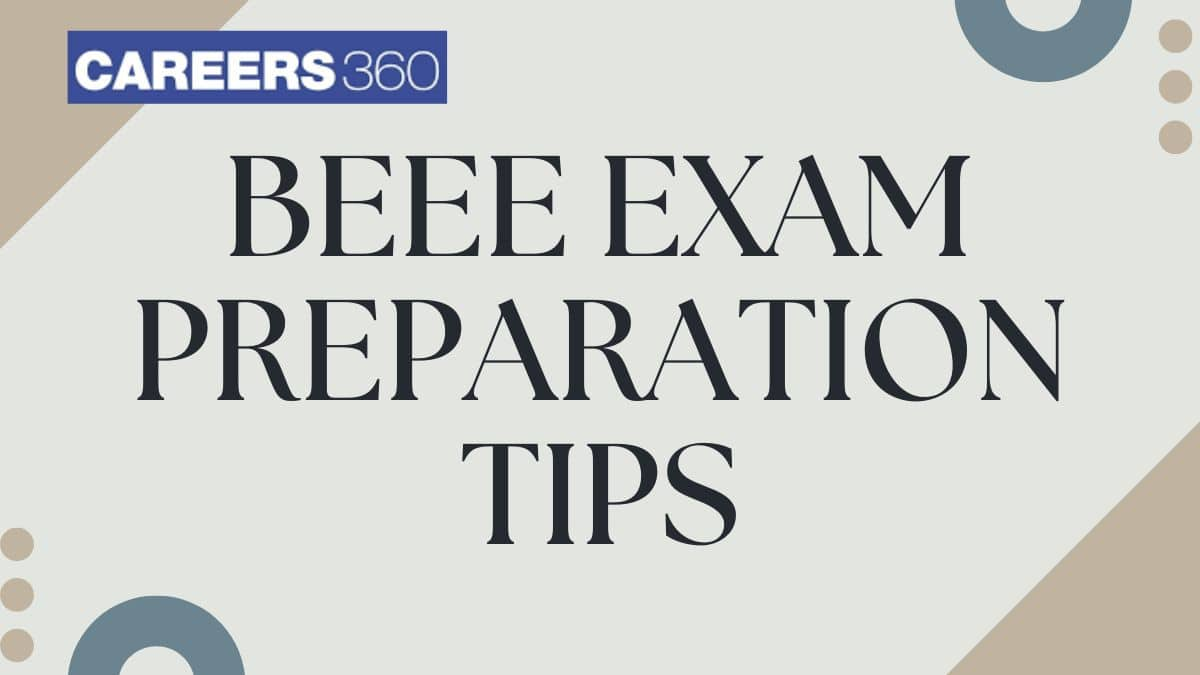UPES B.Tech Admissions 2026
Last Date to Apply: 28th Feb | Ranked #43 among Engineering colleges in India by NIRF | Highest Package 1.3 CR , 100% Placements
BEEE Preparation - Bharat University, Chennai, conducts the Bharat Engineering entrance exam(BEEE) 2026 for admission into B.Tech program at the institute. To ensure excellent marks in the exam candidates must plan a proper BEEE preparation strategy. The first step to a good preparation strategy is being aware of the BEEE exam syllabus and paper pattern. The BEEE preparation process for candidates will need to start at least two months before the exam to get top-notch results. Candidates will need to put in the dedication and study rigorously to prepare for the BEEE exam. Careers360 has compiled the BEEE preparation strategy to guide students in securing good marks in the Bharat Engineering entrance exam. The authority will announce the BEEE 2026 exam dates online. Read the full article to learn about the BEEE preparation structure.
This Story also Contains

Candidates applying for admission into BIHER need to be prepared to pass the entrance exam. Candidates need to understand it is not just the quantity of work put in that will help them reach success. More importantly, it is the quality of work that determines the BEEE exam result. Candidates need to invest their time in coaching and preparation courses that are widely available on the web. Candidates appearing for Bharath Engineering Entrance Exam (BEEE) need to prioritise and balance their daily routine.
BEEE admission can be stressful. The exam tests are structured and designed to challenge candidates on their knowledge to enrol the best candidates to be a part of the institute. Let’s read the below-mentioned Tips and Tricks to prepare accordingly.
BEEE lists out the exam pattern of each exam. Candidates need to read the exam pattern and develop an idea of what to expect during the exam day.
Candidates preparing for their BEEE admission test need to understand which learning style is preferred - Visual, Auditory, Reading, or Writing.
Candidates need to practice sample papers from BIHER's resources regularly to get into the flow of answering questions in a time-bound manner.
National level exam conducted by VIT University, Vellore | Ranked #16 by NIRF for Engg. | NAAC A++ Accredited
98% Placement Record | Highest CTC 81.25 LPA | NAAC A++ Accredited | Ranked #62 in India by NIRF Ranking 2025 | JEE & JET Scores Accepted
Candidates must time themselves while practising the sample questions and gradually keep dropping the time taken to answer each question.
Conduct self-analysing tests to understand the mistakes and areas to improve.
Candidates should note every question answered incorrectly to avoid making the same mistakes during the exam.
Candidates can make use of a clever trick to answer multiple-choice questions using the process of elimination to arrive at the best answer.
Create flashcards of various questions to recall and strengthen the memory.
Revising the study material before the exam day proves to show great results.
Candidates who learn better from listening can refer to the listed Audio Books in this article.
Candidates can get their hands on these Top Books to prepare for BEEE Exam. These listed books are available to purchase online from Amazon or at the bookstore.
| Book Name | Author |
NCERT Physics 11th and 12th class (Part 1) | |
| Problems in General Physics | IE Irodo |
| New Pattern Physics | DC Pandey |
| NCERT Exemplar Problems: Solutions Chemistry | |
| Organic Chemistry | Robert Thornton Morrison |
| Numerical Chemistry | P.Bahadur (Objective) |
NCERT Maths 12th Grade | |
| Trigonometry and Coordinate Geometry | S.L. Loney |
| NCERT Exemplar Problems | Solutions Mathematics Class 11 |
Candidates can refer to these free audio books available online for easy learning and preparation for BEEE exam.
| Audio Books | Author |
| Seven Brief Lessons on Physics | Carlo Rovelli |
| Relativity | The Special and General Theory - Albert Einstein |
| A Brief History of Time | Stephen Hawking |
NCERT Maths Audio Books - Class 12 | |
| It’s Elemental: The Hidden Chemistry of Everything | Kate Biberdorf |
| Liquid Rules: The Delightful and Dangerous Substances That Flow Through Our Lives | Mark Miodownik |
Frequently Asked Questions (FAQs)
The duration of the BEEE exam will be 3 hours.
The exam will be conducted in both online and offline modes.
No, there will be no negative marking for incorrect responses.
Bharat University will announce the BEEE 2026 Exam dates on the official website.
Candidates with the right preparation structure and regular practice will achieve results.
On Question asked by student community
Hello,
Bharath Institute of Higher Education and Research (BIHER) has released the application form of BEEE 2020 in online and offline mode. The authorities have postponed Bharath Engineering Entrance Examination (BEEE) till further notice due to COVID-19. The dates are not yet declared. Keep an eye on the official website
Dear Student,
the BEEE Entrance Examination is applicable to attain admission into Bharath Institute of Higher Education and Research. It is for admission for BArch and BTech streams.
Among top 100 Universities Globally in the Times Higher Education (THE) Interdisciplinary Science Rankings 2026
Recognized as Institute of Eminence by Govt. of India | NAAC ‘A++’ Grade | Upto 75% Scholarships
Highest CTC 44.14 LPA | UGC Approved | 1600+ Recruiters | 100% Placement
NAAC A++ Grade | Recognized as Category-1 Deemed to be University by UGC | 41,000 + Alumni Imprints Globally
India's youngest NAAC A++ accredited University | NIRF rank band 151-200 | 2200 Recruiters | 45.98 Lakhs Highest Package
NAAC A++ Accredited | Accorded institution of Eminence by Govt. of India | NIRF Rank #3